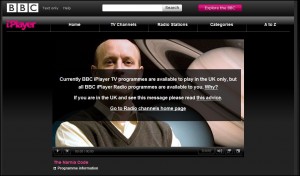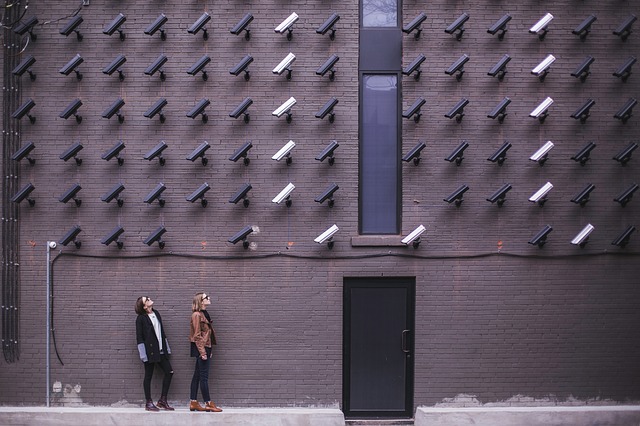Everywhere you look online there are ‘solutions’ to the problem of watching BBC iPlayer overseas. There are proxies, VPNs for sale on hundreds of web sites promising a solution to watching British TV online. However do they really solve that rather annoying block you get when you try and connect to iPlayer when outside the UK. Or indeed that disappointment when you try and watch ITV player abroad too! The solutions have changed over the years and unfortunately now none of the methods to watch UK tv abroad free work anymore. However there are still some options – so how do you choose which is the best one?
Well first the reason you can’t connect, which is basically due to your IP address. When you connect to BBC Iplayer – the application does a simple look up to see where your IP address is registered. If it’s in the UK it lets you in, anywhere else then you get redirected to a polite message saying that you can’t connect.

So you’ll be informed that you can’t watch BBC Iplayer but you can listen to BBC Radio. It’s called geotargeting and it is happening more and more on the internet. Of course it’s great when Google uses it to make sure that you get local results for your search for a plumber, but on the whole it’s used to block access to stuff. You see websites like to control what they charge in different places – the market in USA might support one price but they can charge much more in the UK. It’s online price discrimination and personally I find it rather annoying.
How to Watch BBC iPlayer Overseas
So anyway all these firms supply proxies and VPNs based in various countries across the world. These are servers which you can use to relay your requests to any website you like, the advantage is that you ‘adopt’ the IP address of the server. So if the proxy is in the UK then you’ll have a British IP address and so you can watch UK TV or sites you need, including BBC iPlayer.
It’s not rocket science – so how should you choose between these companies – well here’s my little list of things to check.
What countries are available ?
Now you might only be interested in watching the latest Dr Who series on BBC Iplayer or maybe the BBC News Live online – so you just need a UK server. However I’d advise looking at the companies who supply you access to lots of servers in different countries. For instance if you have access to the US, France or Canada then you can access lots of websites with all the latest shows by using the right country server. Check that you get access to a few countries included in your subscription.
Prices of Subscription
Don’t pay a lot, the prices seem to have come down quite a bit with the increased competition. You should definitely not be paying more than 10 Euros/14 dollars a month for a UK proxy service and the very most and that would be for a large selection of different servers. There are a few floating around that charge much more particularly if you want a dedicated IP address which you don’t need to watch most online media. Be very careful of the free ones, they either don’t work and install nasty adware on your computer or are just so slow are unusable.
VPN or Proxy?
There are two type of service available one is a proxy server which you simply connect to via software or by configuring a manual connection or a VPN (Virtual private network). In practical terms for watching TV all you need to know is what works for which channels. The BBC used to work with either of these, but now will only work with few of the VPN services. A proxy is pretty much useless now because the majority of media companies block them automatically. Which is a shame as this removed the final possibility that you can watch BBC iPlayer abroad free using a simple proxy.
It must be a VPN now, for example most of the US channels like Hulu require a VPN to connect with. Mainly this is due to a VPN being much harder to detect. It’s advisable all things being equal to choose either a service that provides both just in case unless you know that you definitely only want to access the BBC Iplayer. Make sure the service is adaptable, you don’t need complicated software. In fact, the facility to set up the VPN manually adds a lot of flexibility meaning you can use it on other devices and watch UK TV abroad on ipad, smartphones and media streamers.
A quality and secure VPN should work with pretty much any media service in the world as long as the server is based in the right country. You should be able to watch anything in the UK with a British server, you can watch Sky Go abroad if you have a valid subscription too.
Anyway I hope that helps clarify some points – there are lots of great services out there with fast, well run servers so by all means shop around. I actually use the Identity Cloaker as although it’s not advertised as a way of watching BBC iplayer or bypassing these blocks it works perfectly. It has both modes VPN and proxy and has servers in about a dozen countries including UK, US, Canada and Australia to name a few. It also has easy to use software so that you don’t have to set up the connection like you do with a lot of the other services. It’s also primarily a security software which keeps your connection safe but the added advantage is that it won’t get pursued by legal departments like all the other firms who advertise as TV VPN/proxy services. It’s also one of the cheapest!
Anyway you can try the trial version for 10 days to watch BBC iPlayer overseas for just a few bucks – ..

